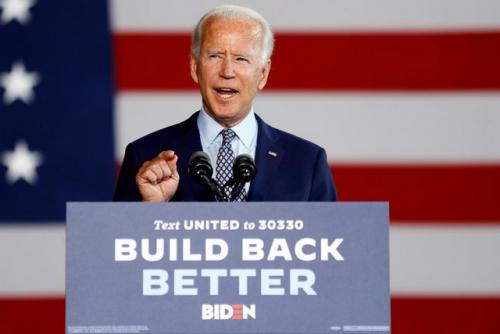The United States after Trump
- Opinión

As the world economy moves towards new normality, a period of profound international transformations is approaching. The economic and health crisis provoked by COVID19 has shown the limits of UN multilateralism and international cooperation, the effects of the trade and technology wars against China, the interests behind technological control of the energy transition, and the loss of US leadership. The election of Joseph Biden prevented the continuation of Trump's programme and restored an international Democratic plan to the executive. Given these changes, what can international relations and our Latin American countries expect after the first 100 days of his mandate?
At the beginning of March, Biden published his Interim National Security Strategic Guidance (INSSG), intending to set out the foreign policy and security foundations to define the new National Security Strategy that will replace that of 2017. The document recognises how China became more assertive and became 'the only competitor capable of combining its economic, diplomatic, military and technological power to pose a challenge to the international system.' It identifies, as the most urgent task, rebuilding its economic foundations, regaining its place in international institutions, modernising its military and diplomatic capabilities, and revitalising its network of global alliances and partnerships. However, the damage caused by the Trump administration in these areas was profound, and the path of reconstruction will face several problems in all areas.
Concerning its place in international institutions, the US spoke out against the World Trade Organisation (WTO), the World Health Organisation (WHO), UNESCO and pulled out of the Iraq Nuclear Agreement, the Open Skies Treaty, the Paris Climate Agreement, and the United Nations Human Rights Council (UNHRC). Under Biden, the US rejoined the WHO and the COVAX programme with an additional $2 billion contribution, and the Paris Agreement, with strengthened emission reduction commitments. In principle, the US rejoins the fight against two of today's most essential crises, health, and climate, but does not address its economic problem and loss of leadership.
In his first 100 days speech, Biden announced his three-part Build Back Better (BBB) agenda: rescue, recovery, and rebuild. The agenda incorporates: 1. Rescue Plan, consisting of $1.9 trillion dollars (T) in income support to households, safe return to schools and reinforcement of the vaccination program; 2. Jobs Plan, dedicated to job creation through an investment of more than $2.3 bdd in construction, infrastructure and clean energy; and 3. Family Plan, consisting of $1.8T spending for "middle-class prosperity" in education, health care, and childcare, as well as changes to the tax law and reversal of 2017 tax breaks. Overall, the BBB comprises more than $6T in federal spending, the largest in its history.
The Biden administration's most sensitive focus, expressed in both the INSSG and the BBB agenda, is the economic recovery that achieves growth, competitiveness, and technological development. Between 2010 and 2019, the US has sustained average GDP growth of 2.2 percent, far below China's 7.6 percent and even 2.8 percent worldwide. The loss of international competitiveness ended with a trade war against the most dynamic economy, which leads not only in terms of growth rate but also in technological innovation, energy transition, and, increasingly, diplomacy. The gap between these two economies is widening.
According to Biden, "there is no reason why wind turbine blades can't be built in Pittsburgh instead of Beijing" or "...why American workers can't lead the world in the production of electric vehicles and batteries". He ignores the minimal productivity gains that have been dragging on for more than three decades and the high wages of US workers and even seeks to increase them. Since 1990, when China began to open its market and, more strongly, since 2000, when it joined the World Trade Organisation, the relocation of production and the building of global value chains have moved towards much more productive economies.
Biden's national security strategy position recognises that 'the US cannot afford to remain absent on the world stage, as it had been under Trump. However, it does not consider whether it is too late or even possible to return to the same place. The legitimacy of US democracy has finally collapsed, after all the interventions and coups in Latin America, the Middle East, and Africa, with the latest spectacle of its last elections and the unchecked policing of racial violence. Despite its massive budget, the BBB plan will face its structural limits and the accelerating global transformations led by China. The risk will then be that economic and political avenues exhausted, the US will seek to regain its leadership by military means. The long-term economic effect of low US growth will be that it will continue to drag down Latin American economies, especially in the Caribbean Basin.
- Armando Negrete, Academic Technician, IIEc-UNAM, member of OBELA
- OBELA: Oscar Ugarteche (Coord.), Carlos de León, Jorge Zavaleta, Priscila Martínez, Bertín Acosta, Hiromi Iijima, Mariana Palacios
Del mismo autor
- El déficit público de EE.UU. y sus efectos globales en el 2021 14/10/2021
- The US public deficit and its global effects in 2021 13/10/2021
- New commodity price hikes 24/08/2021
- Nueva alza de precios en las materias primas 24/08/2021
- The United States after Trump 07/05/2021
- Estados Unidos después de Trump 07/05/2021
- Brexit and Britain’s decline 04/03/2021
- El Brexit y el declive británico 04/03/2021
- The world economy towards the end of 2020 18/11/2020
- La economía mundial hacia fines del 2020 18/11/2020
Clasificado en
Clasificado en:
Crisis Económica
- Geraldina Colotti 07/04/2022
- Julio C. Gambina 07/04/2022
- Rafael Bautista S. 06/04/2022
- Julio Gambina 04/04/2022
- José Ramón Cabañas Rodríguez 01/04/2022








